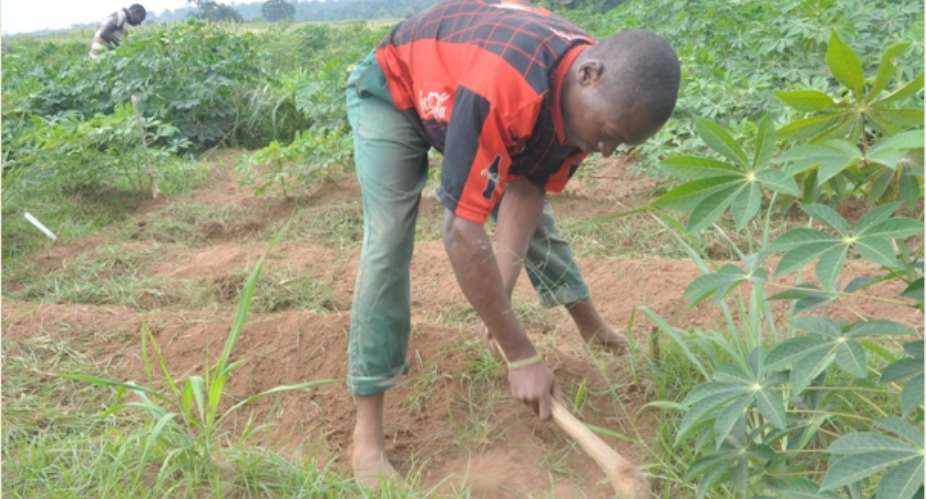In an interactive discussion aimed at unraveling bottlenecks to farming, young farmers identified devastations by weeds as the most challenging constraint demoralizing cassava farming and hurting yields.
“Our experience is that even before you complete the first course of weeding, you see another set of grasses coming behind,” Akinyele Bankole, a youth agripreneur with the International Institute of Tropical Agriculture, said during a meeting with members of the Cassava Weed Management team at IITA.
“We have weeded about five times but it appears we are not doing anything when you see the weeds in the fields. This is the most difficult challenge we are facing,” he said.
“And sometimes it looks discouraging seeing our fields with weeds competing with cassava,” Evelyn Ohanwunsi, another youth agripreneur added..
Generally, farmers weed cassava three times, but in cassava farms where perennial weeds such as spear grass are predominant, more weeding may be required.
Researchers estimate that weeding takes 50 to 80% of the total labor budget, and up to 200-500 hours of labour of mostly women and children per ha are required to prevent economic cassava root losses in Nigeria.
Dr Alfred Dixon, Project Leader for the project Sustainable Weed Management Technologies for Cassava Systems in Nigeria said solutions on weed control in cassava farms were underway following efforts between IITA and partners to combat weeds in cassava.
Under the cassava weed management project, Dr Dixon and his team are conducting research that will develop new best bet innovative weed management practices, combining improved varieties, proper planting dates, plant populations, and plant nutrition, all coupled to intercropping and tillage options, through well-focused trials in the three agro-ecologies where cassava dominates in Nigeria. The project is also testing herbicides for efficacy and economic merit to help make weed control in cassava more efficient and effective.
Dr Dixon said results from the 5-year cassava weed research would be shared with the IITA young agripreneurs and other farmers to enable them to make informed decisions that would not only increase the productivity of cassava but also make cassava farming more attractive and put money in their pockets.
“I am sure with the cassava weed project, we will be able to tackle the menace of weeds… so be rest assured… we will support you,” he said.
Established two plus years ago under the leadership of Dr Nteranya Sanginga, IITA Director General; the IITA Youth Agripreneur program is an Africa-wide initiative that is attracting youths back to agriculture by exposing the youth to the numerous opportunities that exist in the agricultural sector.
Last year, the IITA youth agripreneurs in Nigeria cultivated more than 50 hectares of cassava, maize and soybean. The group intends to more than double the hectarage this year as weather conditions look positive.
Dr Dixon was accompanied by Dr Gbassey Tarawali, Representative of the IITA DG and Deputy Director General (Partnerships & Capacity Development); and Godwin Atser, Communication & Knowledge Exchange Expert. IITA DG Sanginga also dropped by and partook in the focus group discussion.
For information, please contact:
Godwin Atser, Communication & Knowledge Exchange Expert, [email protected]
 A Young Farmer Weeding Cassava Farm
A Young Farmer Weeding Cassava Farm





 There’s nothing you can do for us; just give us electricity to save our collapsi...
There’s nothing you can do for us; just give us electricity to save our collapsi...
 Ghanaian media failing in watchdog duties — Sulemana Braimah
Ghanaian media failing in watchdog duties — Sulemana Braimah
 On any scale, Mahama can't match Bawumia — NPP Youth Organiser
On any scale, Mahama can't match Bawumia — NPP Youth Organiser
 Never tag me as an NPP pastor; I'm 'pained' the 'Akyem Mafia' are still in charg...
Never tag me as an NPP pastor; I'm 'pained' the 'Akyem Mafia' are still in charg...
 Your refusal to dedicate a project to Atta Mills means you never loved him — Kok...
Your refusal to dedicate a project to Atta Mills means you never loved him — Kok...
 2024 elections: I'm competent, not just a dreamer; vote for me — Alan
2024 elections: I'm competent, not just a dreamer; vote for me — Alan
 2024 elections: Forget NPP, NDC; I've the Holy Spirit backing me and nothing wil...
2024 elections: Forget NPP, NDC; I've the Holy Spirit backing me and nothing wil...
 2024 elections: We've no trust in judiciary; we'll ensure ballots are well secur...
2024 elections: We've no trust in judiciary; we'll ensure ballots are well secur...
 Performance tracker: Fire MCEs, DCEs who document Mahama's projects; they're not...
Performance tracker: Fire MCEs, DCEs who document Mahama's projects; they're not...
 Train crash: Railway ministry shares footage of incident
Train crash: Railway ministry shares footage of incident
